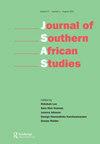马拉维殖民地的上帝、传教士和种族
IF 0.7
4区 社会学
Q2 AREA STUDIES
引用次数: 0
摘要
《种族平等愿景》是大卫·克莱门特·斯科特的传记,他曾在19世纪马拉维的布兰太尔使团工作。通过梳理任务记录,哈里·英格伦描绘了大卫·斯科特作为殖民时代种族平等活动家的形象。阅读殖民地和使团文件的研究人员普遍认为,欧洲人对非洲的传统、文化和习俗发表了贬损性评论。学者们已经证明,传教士对所在社区的评价很高,这表明他们的传教工作取得了令人满意的进展,并证明了进一步资助的合理性。这本书对种族的殖民分类及其在欧洲人和非洲人之间产生的关系提供了新的视角。Englund研究了斯科特的逆转神学,以证明斯科特主张基于不同种族的人的共同人性的平等。这本书的组织和本书所涵盖的主题都反映了Englund之前在非洲,特别是在马拉维的工作,他在那里对各种主题和主题进行了研究,包括人权、民主、身份、本土语言和文学,以及基督教的公共作用。种族平等愿景将神学与身份、平等和人权的讨论结合起来。这本书描述了19世纪马拉维的社会政治环境、使团的建立、欧洲人对非洲人的偏见以及种族间和种族内战争引发的争议。它描述了布兰太尔事件,以显示19世纪马拉维传教士煽动的种族歧视的广度和深度(第2章,至少有一名非洲人被鞭打致死。与此同时,其他人被监禁,在那里他们将在没有食物的日子里度过。在这种背景下,Englund揭示了Scott所采取的独特立场,即拒绝遵守既定的做法和程序。当然,这在保护国的传教士和他在苏格兰的家乡教会的外交委员会成员之间引起了摩擦。Englund出色地展示了Scott参与非洲文化的多种方式,帮助我们理解19世纪传教士工作的社会政治背景。斯科特对基督与非洲人的认同,以及他将传教士视为非洲的学生和学习者的观点,都是他“逆转神学”的产物(第1和112页)。与之前的传教士不同,斯科特认为本文章由计算机程序翻译,如有差异,请以英文原文为准。
God, missionaries and race in colonial Malawi
Visions for Racial Equality is a biography of David Clement Scott, who worked for the Blantyre Mission in 19th-century Malawi. By combing through mission records, Harri Englund has painted a picture of David Scott as a colonial-era activist for racial equality. It is general knowledge among researchers who read colonial and mission documents that Europeans made derogatory comments about African traditions, cultures and practices. Scholars have proved that missionaries wrote favourably about their host community to show satisfactory progress in their missionary work and justify further financing. This book offers new perspectives on the colonial categorisation of the races and the relations it engendered between Europeans and Africans. Englund examines Scott’s theology of reversals to demonstrate that Scott advocated for the equality of people of different races based on their shared humanity. The organisation of the book and the topics that are covered in this book are both reflective of Englund’s previous work in Africa and specifically in Malawi, where he has conducted research on a variety of topics and themes, including human rights, democracy, identities, vernacular languages and literature, and the public role of Christianity. Visions for Racial Equality integrates theology with discussions of identities, equality and human rights. The book describes the socio-political environment of 19th-century Malawi, the establishment of missions, the prejudice that Europeans held towards Africans and the controversies that ensued due to inter and intra-ethnic warfare. It describes the Blantyre Affair to show the breadth and depth of racial discrimination instigated by missionaries in 19th-century Malawi (Chapter 2): this arose when a travelogue published in 1880 by Andrew Chirnside, The Blantyre Missionaries: Discreditable Disclosures, exposed a criminal and social justice system adopted by the Blantyre Mission whereby Africans were punished with lashings, and at least one African was flogged to death. Meanwhile, others were imprisoned, where they would spend days without food. Against this background, Englund unravels the unique position adopted by Scott, one that resisted conformity to established practices and procedures. Of course, this caused friction among missionaries in the Protectorate and members of the Foreign Committee in his home church in Scotland. Englund does an excellent job of demonstrating the diverse ways in which Scott participated in African culture, to help us understand the 19th-century socio-political context of the missionary’s work. Scott’s identification of Christ with the Africans and his view of the missionary as a student and learner in Africa are both products of his ‘theology of reversal’ (pp. 1 and 112). Unlike missionaries who had come before him, Scott assumed the
求助全文
通过发布文献求助,成功后即可免费获取论文全文。
去求助
来源期刊

Journal of Southern African Studies
AREA STUDIES-
CiteScore
1.40
自引率
0.00%
发文量
73
期刊介绍:
The Journal of Southern African Studies is an international publication for work of high academic quality on issues of interest and concern in the region of Southern Africa. It aims at generating fresh scholarly enquiry and rigorous exposition in the many different disciplines of the social sciences and humanities, and periodically organises and supports conferences to this end, sometimes in the region. It seeks to encourage inter-disciplinary analysis, strong comparative perspectives and research that reflects new theoretical or methodological approaches. An active advisory board and an editor based in the region demonstrate our close ties with scholars there and our commitment to promoting research in the region.
 求助内容:
求助内容: 应助结果提醒方式:
应助结果提醒方式:


